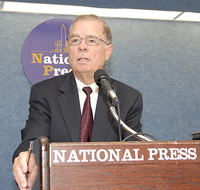A pioneer in the development of next-generation cellulosic ethanol and high-performance specialty enzymes is reporting record growth and advancement towards the commercialization of cellulosic ethanol.
 Massachusetts-based Verenium Corporation reports that total revenues for the quarter ended March 31, 2008 were $15.2 million compared to $11.3 million for first quarter of 2007.
Massachusetts-based Verenium Corporation reports that total revenues for the quarter ended March 31, 2008 were $15.2 million compared to $11.3 million for first quarter of 2007.
Verenium CEO Carlos Riva says he is encouraged by the overall results and achievements of the first quarter. “As planned, our demonstration-scale cellulosic ethanol facility entered the start-up phase and is proceeding on schedule despite significant cost escalation and labor shortages being experienced across the energy sector,” said Riva in a statement.
“We are at a transformational time for both the next-generation biofuels industry and Verenium, as the world is now actively seeking alternate sources of ethanol, particularly those derived from cellulosic biomass,” added Riva.
Verenium operates an R&D cellulosic ethanol pilot plants in Jennings, Louisiana and has entered the start-up phase at its 1.4 million gallon per year demonstration-scale facility. In addition, the company’s process technology has been incorporated into BioEthanol Japan’s 1.4 million liter-per-year cellulosic ethanol plant in Osaka, which is the world’s first commercial-scale plant to produce cellulosic ethanol from wood construction waste.


 Senate Agriculture Committee Chairman Tom Harkin of Iowa says the request would cut short the promise of biofuels for our nation’s energy security and is without merit. He says that “singling out increased biofuels production and use in the United States, European Union and other countries as the chief cause of higher world food prices is an over-simplification of the problem.”
Senate Agriculture Committee Chairman Tom Harkin of Iowa says the request would cut short the promise of biofuels for our nation’s energy security and is without merit. He says that “singling out increased biofuels production and use in the United States, European Union and other countries as the chief cause of higher world food prices is an over-simplification of the problem.” South Dakota Senator John Thune says the call for a waiver from the national ethanol mandate due to higher food prices is simply “misguided.”
South Dakota Senator John Thune says the call for a waiver from the national ethanol mandate due to higher food prices is simply “misguided.”  Florida’s comprehensive “Green Energy” bill passed by the 2008 Florida Legislature last week includes a variety of other initiatives, prompted by Governor Charlie Crist, who praised the legislature for their work on the bill. “I’m very, very proud of the House and Senate in these difficult times they continue to move Florida forward and keep Florida green and make it even better,” Crist said.
Florida’s comprehensive “Green Energy” bill passed by the 2008 Florida Legislature last week includes a variety of other initiatives, prompted by Governor Charlie Crist, who praised the legislature for their work on the bill. “I’m very, very proud of the House and Senate in these difficult times they continue to move Florida forward and keep Florida green and make it even better,” Crist said.



 On Wednesday, Block shared his perspective on food prices and ethanol with the media at the National Press Club.
On Wednesday, Block shared his perspective on food prices and ethanol with the media at the National Press Club. The edition of “Fill up, Feel Good” features comments from EPIC Director of Operations Robert White and SDCUC Executive Director Lisa Richardson about the new program, its goals, how it will work, and how it will benefit consumers.
The edition of “Fill up, Feel Good” features comments from EPIC Director of Operations Robert White and SDCUC Executive Director Lisa Richardson about the new program, its goals, how it will work, and how it will benefit consumers. That’s the question National Corn Growers CEO Rick Tolman presented to the media during a press conference in Washington DC on Wednesday, pointing to the
That’s the question National Corn Growers CEO Rick Tolman presented to the media during a press conference in Washington DC on Wednesday, pointing to the